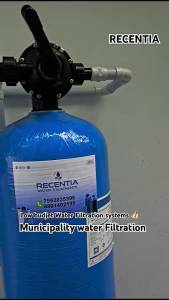Description
Municipal Water: Your Everyday Essential
Municipal water is the water supplied by your local government, treated and delivered directly to your home or business via a network of pipes and infrastructure. It's the lifeblood of our communities, essential for drinking, cooking, cleaning, and countless other daily needs. While often taken for granted, municipal water undergoes a rigorous treatment process to ensure it meets stringent safety and quality standards.
What makes it safe?
The process of providing safe and reliable municipal water is complex and multifaceted, typically involving these key steps:
- Source Water Collection: Water is sourced from various natural resources, including rivers, lakes, reservoirs, and underground aquifers.
- Treatment: The source water undergoes a multi-stage treatment process to remove impurities and contaminants. This often includes:
- Coagulation and Flocculation: Chemicals are added to bind smaller particles together, forming larger clumps that are easier to remove.
- Sedimentation: These clumps settle to the bottom of large basins.
- Filtration: Water is passed through filters of varying sizes to remove remaining sediment and other impurities.
- Disinfection: Chemicals like chlorine or ultraviolet light are used to kill harmful bacteria and viruses.
- Fluoridation (in many areas): Fluoride is added to help prevent tooth decay.
Quality Assurance:
Your local water utility regularly monitors water quality through extensive testing, adhering to strict guidelines set by the Environmental Protection Agency (EPA) and other regulatory bodies. These tests ensure the water meets specific standards for:
- Biological contaminants: Bacteria, viruses, and parasites.
- Chemical contaminants: Heavy metals, pesticides, herbicides, and industrial byproducts.
- Radiological contaminants: Radioactive substances.
- Turbidity: The cloudiness of the water.
- pH levels: The acidity or alkalinity of the water.
Benefits of Municipal Water:
- Safety and Reliability: Rigorous treatment and monitoring ensure a safe and consistent water supply.
- Affordability: Generally, municipal water is a cost-effective solution compared to bottled water or other alternative sources.
- Convenience: Water is readily available at your tap, 24/7.
- Sustainability: Municipal water systems are designed for efficient water management and conservation.
- Environmental Impact: Reducing the reliance on single-use plastic bottles contributes to environmental sustainability.
Potential Considerations:
- Water Hardness: The mineral content of your water can vary, leading to issues like scale buildup in appliances. Water softeners can mitigate this.
- Taste and Odor: Occasionally, taste or odor issues can arise due to algae blooms, industrial discharges, or other factors. Your local water utility will typically address these issues promptly.
- Local Regulations: Specific water quality standards and regulations may vary depending on your location.
For more information about your specific municipal water supply, including detailed water quality reports and contact information, please visit your local water utility's website.
